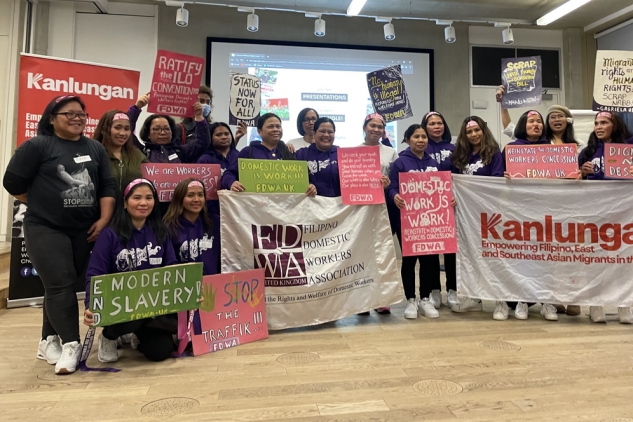
International Domestic Workers’ Day 2022: A decade fighting to restore the rights of domestic workers in the UK
To commemorate International Domestic Workers’ Day 2022, Phoebe Dimacali, Chairperson of the Filipino Domestic Workers Association (FDWA-UK), reflects on her experiences as a domestic worker in the UK and how accessing rights was possible because of the original Overseas Domestic Worker visa, the devastating impact of the changes to the immigration rules made by the UK government 10 years ago, and the fight to restore the rights of domestic workers.
Today, 16 June 2022, is International Domestic Workers’ Day – a day established to celebrate the passing of ILO 189, the Domestic Workers Convention, which recognises the valuable contribution of domestic workers like myself and seeks to protect our rights as workers but which has not been signed or ratified by the UK.
This year’s celebration also marks 10 years since the UK Government revoked key rights within the Overseas Domestic Worker visa, which had guaranteed migrant domestic workers basic rights in the UK, such as the right to switch employers and apply to renew the visa, together with a route towards settlement. In the decade that has since passed, as a domestic worker and community organiser, I have witnessed the terrible consequences of this change to the immigration rules and other changes in immigration policy through the Hostile Environment.
On International Domestic Workers’ Day, I would like to take the opportunity to reflect on these changes and speak on behalf of migrant domestic workers, especially those who have been silenced for so long.
Almost twenty years ago, I was brought to the UK by my then employer. It felt like a contradiction: I was supporting my family by caring for other people’s children and leaving mine behind. My employer was abusive and I left them for my own safety. At the time, migrant domestic workers had the right to change employers in the UK. I found another employer who proved to be more respectful of my rights. After a few years, I received indefinite leave to remain and I was able to bring my two children to the UK, to finally raise them myself. One of my children is now in university studying law and both now have British citizenship. The cycle of exploitation ended when I was granted status in the UK. I pay taxes, national insurance, and contribute to my pension. I’ve made a home here, I’ve found a community and been part of the struggle for our rights as domestic workers.
My experience of recovering and rebuilding a life after exploitation and trafficking is shared by hundreds of other domestic workers who, like me, were given the opportunity to settle here. I am part of a cohort of domestic workers who were a recognised workforce: we could obtain a national insurance number, open bank accounts, register with GPs, and find a place to live. We had the right to apply for a visa extension and became eligible for indefinite leave to remain and British citizenship. We had the right to reunite with our families.
This story no longer rings true for my fellow domestic workers who arrived in the UK after 2012. When the government revoked essential rights within the Overseas Domestic Worker visa, they trapped domestic workers on visas which were tied and are still not renewable, even if the work is ongoing. They tightened our employers’ control over us and perpetuated further exploitation, facilitated human trafficking, and stripped domestic workers of any meaningful protection or way of asserting our rights.
In response to this change in legislation, a group of Filipino women working as domestic workers, including myself, founded the Filipino Domestic Workers Association to provide immediate support for domestic workers and to campaign for our rights to be restored. Since our establishment in 2013, we have rescued hundreds of domestic workers from abusive employers, found them emergency accommodation, and helped them access legal advice. Over the nearly 10 years of our existence, we see the same exploitation happening again and again: workers go unpaid for months, deprived of food, working from dawn to dusk. They’re denied days off or sick pay, they don’t have places to rest or sleep. Their employers keep their passports as a form of control. Due to the change in visa, many become undocumented – having lost the right to apply for visa extensions and settlement – cutting them off from even more support and public services. Migrant domestic workers have been pushed further and further to the margins of society. Their basic workers’ rights have been denied. For a decade now, they have been systematically dehumanised and exploited.
But, as a community of migrant domestic workers, we have mobilised, resisted, and fought back – tirelessly advocating for our rights.
For International Domestic Workers Day, my message and our call to action is for domestic work to be recognised as work, for domestic workers to be recognised as workers, for migrants’ rights to be recognised as human rights. The campaign to reinstate the pre-2012 Overseas Domestic Workers’ issue is a workers’ rights campaign and a migrants’ rights issue: the liberation and empowerment of migrant domestic workers will lead to better workers’ rights and migrants’ rights for the rest of society.
A decade without rights is ten years too many. We call on the UK government to Ratify ILO Convention 189. We call for the reinstatement of the domestic visa concession. Long live migrant worker solidarity!
FDWA-UK is a group led for and by Filipino domestic workers. It is a member organisation of Kanlungan Filipino Consortium. Find out more and get in touch with FDWA-UK here.
